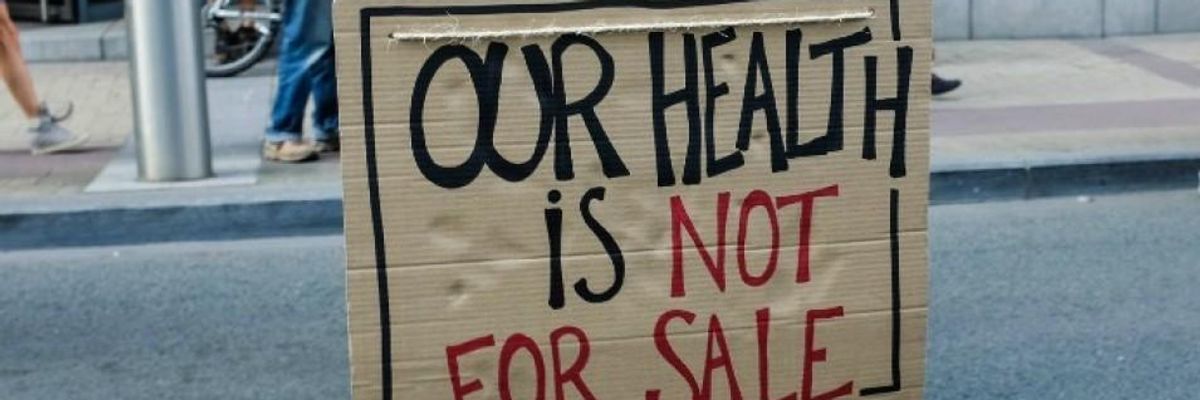America, we have a drug problem, and it's worse than you might realize.
Deep into our third (yes, third) profit-motivated opioid epidemic, we are now also facing a global pandemic without the treatments and vaccines we need to prevent further mass death. At the same time, ordinary Americans who have long struggled to afford their daily medications, such as insulin, now face increasingly difficult choices as they lose jobs and health insurance as a consequence of shutdowns. We have the scientific capacity to eradicate HIV, but only a privileged few can actually afford the prophylactic treatment that could arrest the virus's spread.
These crises are all interrelated, and they all stem from the deadly mistake of treating medicine like a business, rather than a public service.
While we benefit from a highly sophisticated, technically advanced pharmaceutical industry, that same industry systematically--and often catastrophically--fails to meet the needs of our society, our health, and our economy. Without a public option in pharmaceuticals, we're doomed to business as usual, and business as usual has already taken far too large a toll on our society.
Since the beginning of the year, Big Pharma has hiked the prices on 245 drugs, including 61 used in the treatment of COVID-19, restricting access to only those who can pay. Even though the US pumps more public dollars into pharmaceutical development than any other country in the world, ordinary Americans are saddled with the world's highest drug prices.
"In mid-August more than 150 doctors, legal scholars, public health professionals, grassroots movements and more joined me to state unequivocally that there are alternatives to business as usual in the pharmaceutical sector and that we must demand change now." Even with all we pay, we often still cannot get the medications we need between recurring shortages in essential medications and declining innovation in areas critical to public health. On top of it all, we're seeing rising post-market safety issues as drugs are pushed through the approval process faster to secure profits sooner. However, tweaks around the edges won't make things better, as these are all the natural outcomes of an industry oriented around that singular goal of maximizing profit.
To get different outcomes, we need a different design. And that starts with a public option in pharmaceuticals.
In mid-August more than 150 doctors, legal scholars, public health professionals, grassroots movements and more joined me to state unequivocally that there are alternatives to business as usual in the pharmaceutical sector and that we must demand change now.
Medicines and medical knowledge used to be widely treated as a form of public good. But over the years, we've allowed the pharmaceutical industry to become highly privatized and financialized. In the name of "efficiency" competing companies consolidated heavily, vertically integrated, and whittled their supply chains down to the point that we have a single source for many drugs--making our supply very vulnerable to "shocks."
Currently, the enormous public investments we make into the pharmaceutical industry accrue almost entirely to private beneficiaries--principally a small group of shareholders and industry executives--which contributes to growing health and economic inequality as well as rising healthcare costs. Furthermore, those investments are wildly inefficient: large pharmaceutical companies routinely distribute more than 100 percent of revenues to shareholders and invest more in marketing than in R&D. The industry also eschews transparency, regularly practices anticompetitive behavior, and distorts evidence-based medicine to sell its goods--a very dangerous practice when human lives are on the line.
Creating public sector capacity both for full-cycle pharmaceutical R&D and production of essential medicines presents a systemic solution to these problems, superseding the need for piecemeal reforms that could be rolled back in the future.
A public option in pharmaceuticals would ensure end-to-end research and development of new medications in the public interest, create sufficient production capacity for essential medicines, and provide efficient, cost-effective distribution of those medications. Breaking Big Pharma's monopoly on our medicines supply, a public option would also shift the balance of power and reduce the political influence of the industry, making further changes in our pharmaceutical sector possible. Without shareholders to respond to, public pharmaceuticals would be free to focus on developing and distributing the medications most important to public and population health, not just those that stand to bring in the highest profits.
We are now battling the public health challenge of our lifetimes without the tests, treatments, and vaccines we need. Yet more and more of our public dollars are being pumped into a system best placed to produce duplicative, "me-too" drugs that generate excessive profits rather than the medications we most need. We are told to put our hopes for a COVID-19 vaccine into one company after another that has never brought a single product to market because they receive the backing of people in power, or put out nice press releases aimed more at boosting stock prices than advancing science.
However, it was public labs that developed insulin, the world's first lung cancer vaccine, and the diphtheria antitoxin. It was public production of medications that has ensured consistent supply and accessible prices for medications in countries around the world for decades. Now is the time to support and expand that strong public tradition and ensure that medicines are available to all who need them. Publicly owned pharmaceutical companies in countries like Brazil and India have long helped keep costs down and ensure adequate domestic supply of essential medicines.
Now is the time to reclaim medicine as a public good in the United States.
